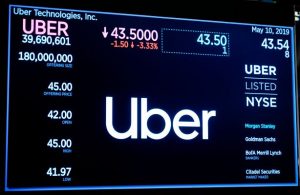Mark Zuckerberg gave an address about free speech at Georgetown University on Thursday. The self-analysis was skin deep; his historical parallels were, in fact, perpendicular; he mischaracterized his opponents with arguments made of straw. And he offered a favorite refrain of the widely reviled—hey, if both sides hate us we must be doing something right!
A recent essay in BookForum took note of this kind of less-than-rigorous centrist sophistry, which frequently finds its way to mainstream op-ed pages. “Incoherence is now a virtue,” writes Tobi Haslett, rhetorically shaking his head. “Rather than irony, modesty, discernment, ambivalence, or the mental sprightliness needed to parse conflicting views, a proud refusal to make solid arguments may be the cure for our divided times.”
In its rough outlines, Zuckerberg was trying to tell a coherent story—namely, that the internet has given voice to the voiceless and that some misguided souls, in their haste to root out hate speech and misinformation, were throwing the baby out with the bathwater. He questioned their motives, too. While his side was acting on principle, his opponents appeared to be masking political ambition. “More people, across the spectrum,” he said of his foes, “believe that achieving the political outcomes they think matter is more important than every person having a voice.” Later, he picked up this point, “Democracy depends on the idea that we hold each others’ right to express ourselves and be heard above our own desire to always get the outcomes we want.”
The problem for Zuckerberg, however, were the inconvenient facts about how Facebook operates. Recently, Zuckerberg met with President Trump in the White House, and shortly thereafter Facebook changed its internal rules to allow the Trump campaign (and other politicians’ campaigns) to spread misinformation. (It’s true that correlation doesn’t necessarily prove causation, but the timing of the rule change looked fishy.) Zuckerberg even had the nerve to refer to this species of misinformation as “primary source speech.” (I distinctly remember being told in high school to consult primary sources to be most accurate.)
How, exactly, does allowing the current president to spend millions on false advertising help every person have a voice? Zuckerberg answered that question with another question: Hey, what is misinformation, anyway?
Misinformation might be satire, he said. It might be a long-ago story misremembered. It might even be the civil rights movement!
Zuckerberg twice referenced the civil-rights-era libel case New York Times v. Sullivan, which granted broad protections for publishers to print inaccuracies. The idea is that a free press needs some breathing room to make errors in the rough and tumble of the information maelstrom. Only inaccuracies about public figures like Sullivan published with “actual malice” can be considered libelous, the Supreme Court ruled. But in Zuckerberg’s warped telling, that case “was actually about an ad with misinformation, supporting Martin Luther King Jr. and criticizing an Alabama police department.” Does he really believe this? That the civil rights movement was engaged in a Trump-style misinformation campaign to rile up its supporters?
A little history refresher: New York Times v. Sullivan involved relatively minor errors in an ad that informed Northerners about the heinous conditions for African Americans in Alabama. The ad, which ran in March 1960, misstated the number of times King was arrested and flubbed the description of how the police were deployed to contain civil rights protestors. The police chief in Montgomery, L. B. Sullivan, who wasn’t named in the ad, sued for damages. An all-white jury in Alabama awarded him damages of $500,000. (The equivalent of about $4.3 million today.) The Supreme Court reversed the decision unanimously and laid down rules to stop a racist state government from using the courts to punish its enemies.
This false invocation of the civil rights movement highlights the incoherence—not to mention dishonesty—in Zuckerberg’s argument. He is so intent on depicting himself as the defender of voices of the dispossessed that he frames his bending to the rich and powerful as similar to defending civil rights protestors facing water cannons in Alabama.
At one point, Zuckerberg argued that the easiest thing would be for Facebook simply to not accept political ads. “From a business perspective, the controversy certainly isn’t worth the small part of our business they make up,” he said. “But political ads are an important part of voice—especially for local candidates, up-and-coming challengers, and advocacy groups that may not get much media attention otherwise. Banning political ads favors incumbents and whoever the media covers.”
To start, publishing political ads is valuable to Facebook’s business beyond the revenue it brings in. Politicians may well decide to break up the company. For self-preservation reasons, Facebook has a stake in cultivating a friendly commercial relationship with those politicians as opposed to declaring their money too dirty to touch. Ideally, of course, someone like Donald Trump takes office who believes that a monopolistic, largely unregulated Facebook was vital to his victory.
But if, indeed, Facebook really didn’t care about losing the money from those ads, it could still ensure a robust political square by publishing politicians’ statements for free. When there were stringent campaign spending limits, you might credibly argue that access to advertising was an important leveling force. But with political spending largely unregulated, advertising actually magnifies the difference between well-funded candidates and those on the fringes.
Another factual problem for Zuckerberg is that Facebook blocks nudity despite its importance as a means of personal expression. He dealt with that hypocrisy briefly and spoke of pornography rather than nudity. Pornography, he said, “would make people uncomfortable using our platforms.” Before and after he suggested that people who were made uncomfortable by hate speech should simply tolerate it as long as people are “critical of groups without dehumanizing them.” What’s the difference in the discomforts?
I have a suggestion for Zuckerberg: Why not drop all the posturing about getting more voices heard or helping promote progressive change like the civil rights movement? Better that he defend unfettered speech as something that just makes sense to him or feels right or is divinely ordained or market dictated, no matter the consequences it brings. We are all watching the consequences, and they are not helping his case.
More Great WIRED Stories
- WIRED25: Stories of people who are racing to save us
- Massive, AI-powered robots are 3D-printing entire rockets
- Ripper—the inside story of the egregiously bad videogame
- USB-C has finally come into its own
- Planting tiny spy chips in hardware can cost as little as $200
- 👁 Prepare for the deepfake era of video; plus, check out the latest news on AI
- 🏃🏽♀️ Want the best tools to get healthy? Check out our Gear team’s picks for the best fitness trackers, running gear (including shoes and socks), and best headphones.



